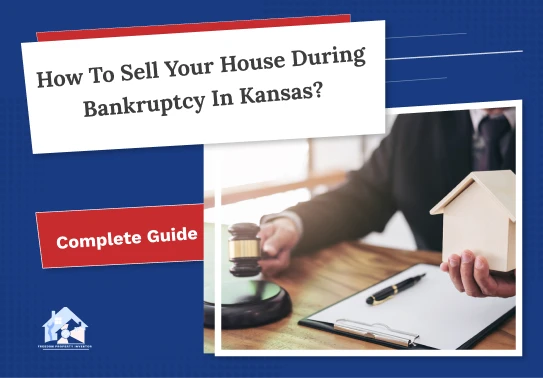
Introduction: Understanding the Dual Challenge – Bankruptcy and Selling a House
In life, unexpected financial hardships can sometimes lead to situations where challenging decisions need to be made. One such decision that can arise is the need to sell a house during bankruptcy in Kansas. This unique confluence of circumstances requires a deep understanding of both the real estate market and the legal intricacies of bankruptcy proceedings.
At its core, bankruptcy is a legal situation that helps individuals and businesses get relief from very large debts. It offers a chance to reorganize financial affairs and, in some cases, obtain a fresh start. Bankruptcy, however, is not a simple process; it involves various chapters, each tailored to different financial situations.

What is Bankruptcy?
Bankruptcy is a legal proceeding that allows individuals or businesses to seek financial protection when they are unable to meet their debt obligations. It’s a lifeline for those who find themselves drowning in debt and struggling to regain financial stability. With bankruptcy, people can either eliminate all their debts or come up with a reasonable plan to pay them back. This helps them move ahead without always feeling weighed down by huge financial responsibilities.
Types of Bankruptcies
Multiple types of bankruptcy chapters exist, but the two most frequently encountered by individuals are Chapter 7 and Chapter 13:
Chapter 7 Bankruptcy:
Often referred to as “liquidation bankruptcy,” Chapter 7 involves the sale of non-exempt assets to repay creditors. However, some assets are protected under exemptions, which can include a portion of the equity in your home.
Chapter 13 Bankruptcy
This is known as “reorganization bankruptcy.” It involves creating a court-approved repayment plan to pay off debts over a period of three to five years. This option is often chosen by individuals who have a steady income and want to keep their assets, such as a house.
Bankruptcy is governed by federal law, and the process can be complex and daunting. It requires careful consideration of numerous legal factors, including exemptions, debt priority, and court proceedings. Therefore, seeking the guidance of a bankruptcy attorney is highly recommended. An attorney well-versed in bankruptcy law can provide invaluable insights, helping you make informed decisions about your financial future.
Benefits of Filing for Bankruptcy
While bankruptcy might seem like a daunting step, it offers significant benefits, especially when combined with the sale of a house. Filing for bankruptcy can halt foreclosure proceedings, providing you with the opportunity to assess your financial situation and explore options for debt relief. Selling your house during bankruptcy can potentially allow you to extract value from your property, offering a means to repay creditors and find a fresh financial start.
Real Estate Bankruptcies: The Intersection of Property and Debt
Real estate bankruptcies involve a delicate interplay between property ownership and financial distress. The decision to sell a house during bankruptcy involves evaluating the property’s value, understanding exemption laws, and addressing any liens or title issues. It’s a complicated undertaking that requires a thorough grasp of both the real estate market and the regulations surrounding bankruptcy. When planning to sell a house during bankruptcy, consulting both a bankruptcy attorney and a real estate agent can help you navigate the intricacies effectively.
Bankruptcy Property: Exploring Options
When dealing with a property in bankruptcy, there are multiple paths to consider. You could choose to keep the property and work out a repayment plan, surrender the property to discharge the debt, or sell the property to pay off creditors. The best course of action depends on your financial goals and the specifics of your bankruptcy chapter.
Bankruptcy House Sale: Balancing Act
Selling a house during bankruptcy requires a delicate balance between maximizing the sale price and adhering to bankruptcy regulations. The proceeds from the sale can play a crucial role in your bankruptcy case, potentially impacting the amount of debt you need to repay and your financial future.
Assessing Your Property’s Value
As you embark on the journey of selling your house during bankruptcy, understanding the value of your property is paramount. Properly assessing your property’s value enables you to make informed decisions about pricing, negotiations, and potential proceeds distribution. Let’s dive into two crucial aspects of property valuation: the role of an appraisal and the impact of property upgrades.
The Role of an Appraisal: Determining Fair Market Value
An appraisal is an expert evaluation of your property’s worth carried out by a licensed appraiser. In the context of selling your house during bankruptcy, an appraisal provides an objective and unbiased estimate of your property’s fair market value. The fair market value represents the amount that a ready buyer and willing seller would settle on within an unrestricted market without any excessive pressure.
During an appraisal, several factors are considered, including the property’s size, location, condition, recent sales of similar properties nearby, and the ongoing trends in the market. This process ensures that you have an accurate understanding of your property’s worth, which is essential for setting an appropriate listing price and engaging in negotiations.
Considering Property Upgrades for an Impact on Selling Price
Before listing your house for sale, you might consider making upgrades or repairs to enhance its appeal and potentially increase its value. Upgrades can range from minor cosmetic improvements to significant renovations. However, it’s important to approach upgrades strategically, especially in the context of bankruptcy.
Consider the following points:
- ROI-Focused Upgrades: Focus on upgrades that offer a solid return on investment (ROI). Kitchen and bathroom upgrades, fresh paint, and improved curb appeal are often smart choices.
- Budget Considerations: Be mindful of your budget. Your goal should be to improve the property’s value while avoiding excessive spending that could undermine your overall financial goals.
- Bankruptcy Impact: Depending on your bankruptcy chapter, exemptions might apply to certain upgrades. Communicate with your bankruptcy lawyer to confirm that any enhancements carried out are in harmony with your bankruptcy plan.
- Market Trends: Explore the local real estate market to grasp which upgrades are sought after by buyers. This can assist you in making decisions that appeal to potential buyers and support a higher asking price.
The Power of Exemptions
A very common question that arises in the mind is: Can the homeowner retain any proceeds if they sell their house during bankruptcy proceedings? When selling your house during bankruptcy, exemptions play a crucial role in safeguarding your assets and ensuring that you retain a fair portion of your property’s value. Let’s delve into two crucial elements of exemptions that can greatly influence your bankruptcy case.
Homestead Exemption in Kansas: Protecting Your Home Equity
Safeguarding Your Home Equity in Kansas, the homestead exemption permits you to shield a specific portion of the equity in your main residence from being utilized to repay creditors. As far as I know, the homestead exemption amount was substantial, offering protection for a significant portion of your property’s value. This exemption recognizes the importance of providing individuals and families with a place to live while seeking debt relief through bankruptcy.
Maximizing Exemptions: Strategies to Safeguard Your Proceeds
To maximize the benefits of exemptions, it’s essential to work with your bankruptcy attorney to strategically plan your bankruptcy and property sale. You might consider:
- Understanding Local Laws: Learn about specific exemption laws in Kansas and how they apply to your situation.
- Timing the Sale: The timing of your property sale can impact the availability of exemptions. Consult with your attorney to determine the best timeline.
- Using Exemptions Wisely: Exemptions can also be used to protect other valuable assets, such as vehicles or personal property. Your attorney can help you allocate exemptions effectively.
- Professional Guidance: Enlist the expertise of your bankruptcy attorney to ensure that you’re making the most of available exemptions while complying with legal requirements.
Transparency with Creditors
Maintaining open and transparent communication with creditors is a key component of successfully selling your house during bankruptcy. By proactively informing creditors about your intent to sell and engaging in negotiations, you can work toward finding a mutually beneficial solution. Let’s explore two vital aspects of transparency with creditors.
Informing Creditors about Your Intent to Sell
Once you’ve made the decision to sell your house during bankruptcy, it’s important to notify your creditors promptly. This communication serves multiple purposes:
- Managing Expectations: Informing creditors about your intent to sell demonstrates your commitment to addressing your financial obligations. It sets the stage for open dialogue.
- Preventing Misunderstandings: By sharing your plans, you reduce the likelihood of misunderstandings or assumptions about your financial situation.
- Facilitating Negotiations: Transparency can create opportunities for productive negotiations that align with your bankruptcy goals.
Negotiating with Creditors: Balancing Debt and Sale Proceeds
Negotiating with creditors is a delicate balancing act that requires strategic planning and clear communication. Here are steps to consider:
- Understand Your Priorities: Determine your financial priorities, whether it’s repaying specific debts, protecting equity, or securing your financial future.
- Share Relevant Information: Provide accurate and up-to-date financial information to creditors. This helps them understand your situation and potential benefits from the property sale.
- Propose a Plan: Present a proposed distribution plan for the sale proceeds. This plan should align with bankruptcy regulations and your repayment priorities.
- Seek Professional Guidance: Work closely with your bankruptcy attorney during negotiations to ensure your proposed plan is fair, reasonable, and legally compliant.
Effective negotiations can result in agreements that allow you to sell your house, repay creditors, and move forward with your financial rehabilitation.
Collaboration with a Real Estate Agent
Partnering with an experienced real estate agent is a strategic move when selling your house during bankruptcy. Their expertise can guide you through the complexities of the real estate market while ensuring your bankruptcy considerations are taken into account. Let’s delve into two crucial aspects of collaborating with a real estate agent.
Finding an Agent Experienced in Bankruptcy Sales
Not all real estate agents are well-versed in the nuances of bankruptcy sales. While choosing an agent, seek out someone with a track record of dealing with sales during bankruptcy proceedings. This expertise is immensely valuable as they grasp the distinct challenges and demands involved. A seasoned agent can navigate legal intricacies, handle negotiations, and assist you in making well-informed choices.
To find the right agent, consider:
- Research: Look for agents who specialize in bankruptcy sales or have a track record of successfully guiding clients through similar situations.
- Interview: Schedule consultations with potential agents to discuss your circumstances, gauge their familiarity with bankruptcy sales, and assess their approach.
- References: Request references from previous clients who sold their houses during bankruptcy with the agent’s assistance.
Setting the Right Price: Aligning Market Realities with Debt Considerations
Proper valuation of your property is crucial when planning to sell a house during bankruptcy. Determining the listing price of your property requires a delicate balance between market realities and your bankruptcy objectives. A proficient real estate agent will perform a Comparative Market Analysis (CMA), taking into account elements like recent sales of comparable properties, the state of the local market, and the distinctive qualities of your property.
However, in the context of bankruptcy, other factors come into play:
- Debt Repayment: The sale proceeds may be used to repay creditors, affecting the amount you’ll retain. Your agent should be aware of this and work closely with your bankruptcy attorney.
- Equity Protection: If you’re entitled to homestead exemptions or other protections, your agent should be well informed to ensure the listing price aligns with these considerations.
- Negotiation Strategy: Your agent can develop a negotiation strategy that aims to balance your financial goals with the potential buyer’s offer, taking into account your bankruptcy situation.
Exploring Your Options: Sell Your Home to Cash Buyers During Bankruptcy
When you decide to sell a house during bankruptcy, it’s important to consider the potential outcomes of your financial situation. If you’re dealing with bankruptcy and need to sell your home, it’s smart to look at all your options. One good thing to do is to compare the offers you get from different cash home buyers. Think about the good things that come with each offer. While you’re thinking about this, remember that Freedom Property Investors is here, too.
We’re one of the cash home buyers in kansas, and we’re ready to make a fair offer for your home. Our team knows about bankruptcy and wants to make things easy for you. So, as you’re looking at different offers, know that Freedom Property Investors is here to help you find the best way forward. Reach out today to talk about your choices and decide what’s right for you.
When selling your house during bankruptcy, navigating the legal aspects is crucial to ensure a smooth and compliant process. Let’s delve into two critical legal considerations: required disclosures and potential roadblocks related to liens and title issues.
Disclosures Required in a Bankruptcy Sale
Transparency is key in a bankruptcy property sale. You’re required to disclose:
- Bankruptcy Status: Inform buyers that the sale is part of a bankruptcy proceeding to ensure transparency.
- Property Condition: Accurately detail the property’s condition, including any defects, to avoid legal complications.
- Outstanding Liens: Disclose any existing property liens or encumbrances so buyers are aware of financial claims.
Potential Roadblocks: Handling Liens and Title Issues
Addressing roadblocks like liens and title issues is vital:
- Liens: Resolve existing property liens before the sale. Consult your bankruptcy attorney for the best approach.
- Title Issues: A clear title is essential. Address any title disputes or inaccuracies before finalizing the sale.
Offers, Negotiations, and Closing
Navigating offers, negotiations, and the closing process when selling your home during bankruptcy demands thoughtful consideration. Let’s delve into two key aspects: weighing offers for financial gains and debt relief and negotiating while balancing flexibility and protection.
Evaluating Offers: Balancing Finances and Debt Relief
When assessing offers, balance financial gains with your debt relief goals. While a higher price might be appealing, ensure the sale aligns with your bankruptcy aims. Work with your bankruptcy attorney to make informed decisions that support your overall financial well-being.
Negotiating with Bankruptcy in Mind: Flexibility and Protection
Negotiating during bankruptcy calls for a delicate equilibrium between flexibility and protection. Strive for the best deal while staying compliant with bankruptcy rules and court approvals. Your bankruptcy attorney is a vital ally in these negotiations, ensuring your interests are safeguarded throughout the process.
Proceeds Allocation and Court Approval
In the final stages of selling your house during bankruptcy, two vital steps await: distributing sale proceeds and seeking court approval. Let’s dive into these essentials:
Distributing Sale Proceeds: Priorities and Hierarchy
Proceeds are allocated based on creditor priorities. Secured creditors, like mortgage holders, come first, followed by unsecured creditors. Understanding this hierarchy ensures a fair distribution of proceeds.
Seeking Court Approval: Formalizing the Sale
To finalize the sale, court approval is needed. Your bankruptcy attorney will submit sale details for review. Once approved, the sale progresses, offering financial relief and a fresh start.
Staying Informed and Adapting
As you progress through the process of selling your home during bankruptcy, staying informed and flexible is crucial. Let’s explore two important aspects:
Keeping Abreast of Legal Changes: Kansas Regulations
Laws can change, especially in Kansas. Stay updated on specific regulations with guidance from your bankruptcy attorney. This knowledge helps you make informed decisions that comply with current laws.
Adapting to Market Fluctuations: Flexible Strategies
Real estate markets can shift. Stay adaptable to market changes. Your real estate agent can offer insights, helping you adjust your strategy to suit current market conditions.
Emotional Resilience and Moving Forward
Selling your house during bankruptcy involves more than finances; it’s an emotional journey, too. Two key points:
Balancing Financial Realities and Emotional Attachment
Letting go of a home is tough, especially when there’s emotional attachment. Finding a balance between financial needs and emotional ties is challenging but necessary for a fresh start.
Embracing a New Chapter Post-Sale
Selling your home in bankruptcy signifies closure and a new beginning. Embrace this change as an opportunity for personal growth. Look forward with optimism, ready to create a brighter future for yourself.
Wrapping Up
You’ve shown incredible strength in navigating the complex process of selling your house during bankruptcy in Kansas. As we wrap up this journey, remember that triumph can emerge from challenging times. Balancing money decisions, legal rules, and your feelings might not have been easy, but you’ve done it.
You’ve learned about bankruptcy options and teamed up with professionals. By looking at offers, negotiating smartly, and getting court approval, you’ve taken big steps toward regaining control over your finances. Adapting to changing markets and dealing with emotions also showed your courage to embrace change.
Through this guide, you’ve realized that even in tough times, there’s a way forward. You’ve gained knowledge, had support from experts, and discovered your inner strength.
Triumph isn’t just a word; it’s a series of brave choices. Your journey toward financial stability and a fresh start is proof of your determination. As you move ahead, may the lessons you’ve learned guide you to a brighter future.













 (808)-444-7084
(808)-444-7084